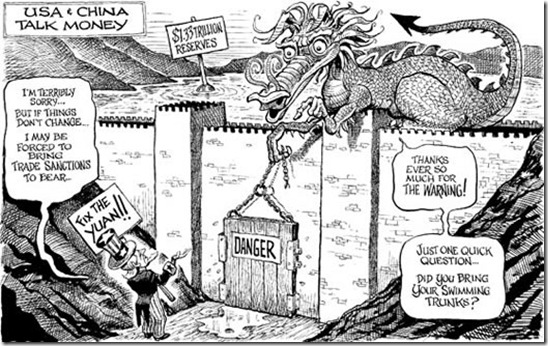Part one is here, where I noted China’s growing fear of encirclement (I get Chinese students a lot who talk about this). So, in the role of China, I argued for an Indian charm offensive to prevent encirclement, and how China might buy off Korea from the US camp by abandoning North Korea. Here are some more ‘B-Team’ style ideas for pushing back on US local dominance, including swarming the US navy in the western Pacific with cheap drones and missiles:
3. Build missiles and drones; don’t bother with a navy.
I’m not a big hardware guy, but it should be pretty obvious that trying to ‘out-ship’ the Americans one-to-one in the western Pacific (as the Kaiser tried to do against Britain before WWI) would be a ridiculously costly fool’s errand. Japan’s failed effort to dominate vast Pacific in the 1940s is a good object lesson in how hard that is and how the Americans will fight tooth-and-nail to prevent it. It makes far more sense to pursue an ‘access-denial’ approach in the medium-term, and China, unlike Iran in the Straits of Hormuz, actually has the money and technology to attempt this. China should pursue regional (East Asian) dominance first (as Mearsheimer has argued for a decade), and then tangle with the Americans over the much larger game of the Pacific later. So access-denial – making it harder and harder for US and allied navies to operate west of Guam (the so-called second island chain strategy) – is a good first step. Throwing swarms of cheap rockets and drones against hugely expensive, slow-moving US carriers is vastly cheaper, fights asymmetrically where the US hegemon is weak, looks less threatening (defensive balancing), and can be marketing as defending Asia against US interventionism. And stick with robots and missiles. They’re getting very cheap and increasingly outclass human platforms. Planes that don’t carry pilots can stay aloft longer and project further, hovering over the battlespace for long hours. I just reviewed an essay for an SSCI journal on whether carriers in the Pacific will be obsolete in two decades (the author’s answer was probably). So let the Americans go on buying fewer and ever more expensive ships and planes costing mountains of money – and then ‘swarm’ them with masses of super-cheap missiles and drones. (On the issue of America’s tendency to buy few and expensive platforms instead of many and cheap, try this.)
4. Buy European debt.
Unless China switches to internal consumption soon, it will continue to rack up currency reserves from OECD states. Buying OECD sovereign debt is a great way to get leverage over those economies. And buying Euros is especially useful.
First, it pressures the US by reminding Americans of China’s leverage over the US budget. It reminds Americans that China can take its money elsewhere, and that a nasty US budget crunch would ensue a real rupture with China. Nothing fuels American hysteria so much as the idea that China ‘owns’ the US or something. Buying Euro-debt drives up US interest rates and keeps America fretting that it needs to be nice to its ‘banker’ and all that. Conversely, if China refuses to put its savings than into anything other than US T-bills, expect the the US to play tougher.
Second, buying Euro-debt helps keep the Europeans out of any tangles between China and the US camp in Asia. Just as European dependence on Russian oil threatens to neutralize the EU in the long struggle over Eastern Europe’s post-Cold War course, so a dependence on Chinese finance is a method to handicap NATO grandstanding about Asia. Besides, what else should China do with the money? Buy even more debt from the US? At some point, getting so vested in US T-Bills threatens China, because so much of its wealth is in one place, its possible strategic competitor.
5. Keep propping up troublemakers like Sudan and Zimbabwe.
Nothing distracts American policy-makers like upstart little countries that have the nerve – the nerve! – to stick their finger in the eye of the US. Don’t they recognize American exceptionalism! Witness Iran, Iraq, Venezuela, Cuba… And nothing convinces the US to waste mountains of money on unnecessary defense procurement and pointless conflicts like these guys. So if you’re China, propping up local baddies is great tool. Yes, it makes you look like you’ll support anyone (which is true, of course, because you’re nasty communist oligarchs after all who couldn’t care less about the Darfuris). But the benefits – wasteful military spending plus American hysteria and imperial overreaction, leading to consequent global unease with American power – more than outweighs the costs. Anything to keep the Americans saying crazy, patently ridiculous stuff like ‘Iran is a mortal threat to the US,’ reckless talk that scares the whole planet and alienates the developing world where 4/5 of the world’s population lives. Encourage the US to dissipate its energies in the periphery while the rest of the world worries that the otherwise good idea of the ‘responsibility to protect,’ e.g, is really neocolonialism, because American just can’t help itself. If American comes off as a revisionist hegemon that can’t help but pursue rogue states, China looks restrained by comparison.
Cross-posted at Duck of Minerva.
Filed under: Asia, China, Europe, Foreign Policy, United States
Assistant Professor Department of Political Science & Diplomacy Pusan National University @Robert_E_Kelly |
|




Recent comments